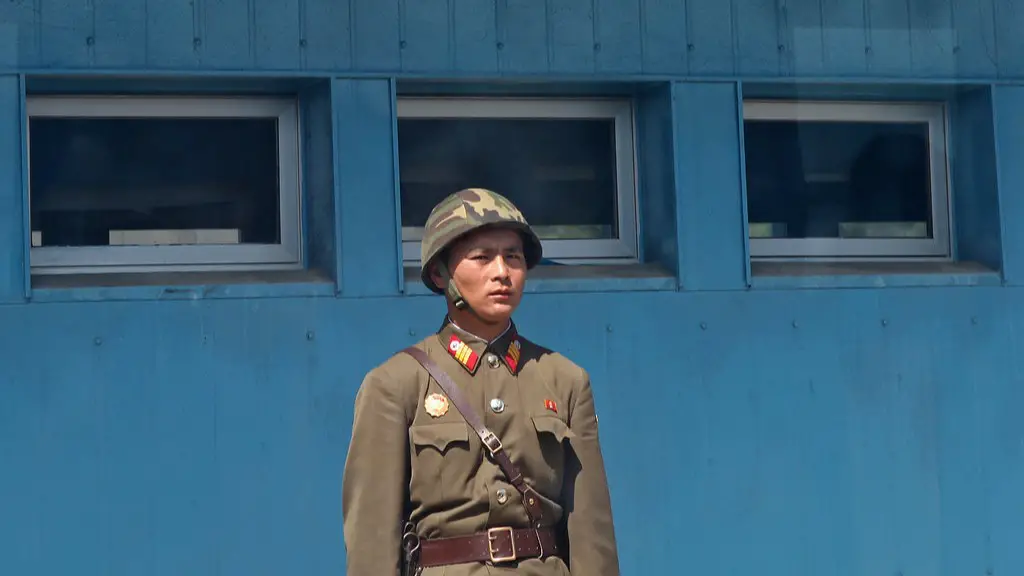Economic Reasons
The North Korean regime came to power in 1948 and has since kept the country isolated from much of the world. While the nation is highly secretive and its population is forcefully kept in an information bubble, there are a number of reasons why North Korea is isolated from the world. Many of these are economic in nature.
North Korea is impoverished and heavily reliant on foreign aid to meet its citizens’ basic needs. Its economic decisions have damaged relations with other countries and caused them to limit trade. For instance, the government does not even abide by its own constitution, which calls for freedom of economic choice, because it has decided to control every aspect of the economy. This means that foreign businesses have found it difficult to invest in the country and its few trading partners are left with little to offer in the face of North Korea’s unwillingness to open up its economy.
The United Nations Security Council imposes strict international sanctions on North Korea for the development of nuclear weapons, a move that has only further isolated it from the global economy. The international sanctions limit the amount of money that North Korea can receive through trade with other countries. This makes it impossible for the country to conduct international trade and severely restricts the amount of foreign investments it can receive. This makes it extremely difficult for North Korea to recover from its economic crisis and creates an even deeper sense of isolation.
Additionally, North Korea‘s economy is centrally planned and the government has taken over most construction and industrial ventures. This means that international companies can not easily invest or operate in the country. North Korea also has a limited number of natural resources, meaning it cannot benefit from exporting these necessary goods.
North Korea is a communist country and it has a difficult relationship with many of the world’s democratic nations, making it an outcast in terms of international relations. Since the 1991 collapse of the Soviet Union, North Korea has lost its main source of foreign aid, which has caused its economy to suffer.
Military Reasons
The presence of a large-scale military force is another factor that has kept North Korea isolated from the world. Its huge military presence is a direct threat to its neighbors, particularly South Korea and Japan.
North Korea’s military is one of the largest in the world, estimated to have at least 1.2 million soldiers. It is known to have chemical and biological weapons, and it has nuclear ambitions, despite international pressure to cease its weapons program.
The country also has a policy of militarism and its government spends vast amounts of money on its military instead of investing in its economy or its citizens. This attitude towards military power combined with its huge military presence creates a tense environment, with the possibility of sparking a conflict in the region. This dissuades other countries from getting involved and increases North Korea’s sense of isolation.
In addition, North Korea sometimes takes aggressive stances towards other countries, especially South Korea and Japan. This further contributes to the country’s isolation and its reputation as a hostile and unpredictable nation.
North Korea has long been known to be a rogue state, as it has defied international laws and norms in its foreign policy and past actions. For instance, North Korea has been accused of sinking a South Korean warship in 2010 and launching cyber-attacks on South Korean banks and businesses. These hostile activities have damaged the country’s already crippled relations with other countries.
Political Reasons
The political situation within North Korea is another factor that has led to its isolation. North Korea is a closed society and its leaders do not share information with the international community. This has proved to be an immense obstacle in improving relationships between North Korea and other countries.
North Korea is ruled by an authoritarian government that restricts freedom of speech and press as well as basic human rights. This has made it difficult for the country to promote its policies abroad, as other countries are not likely to do business with a nation that does not respect human rights.
The authoritarian government is also responsible for North Korea’s extreme poverty, as it has prioritized its military over its citizens’ welfare by spending the country’s limited resources on weapons. Furthermore, this oppressive regime has sequentially kept North Korea in a state of perpetual crisis, as its citizens lack basic infrastructure and services.
Moreover, North Korea maintains close ties with China and Russia, its two main allies. They provide the country with much needed resources, such as fuel and food. While this keeps the country alive, it also puts North Korea in debt and further isolates it from the rest of the world.
Lastly, North Korea’s stance on reunification with South Korea is another factor that has caused its isolation. While South Korea is seen as a democracy, North Korea does not want anything to do with its neighbor and strongly opposes reunification. This has caused much tension in the region, which has only driven North Korea further away from the international community.
Cultural Reasons
North Korea’s culture and its citizens’ opinions are another factor that has kept the country isolated from the international community. North Koreans are taught to have an extreme loyalty to their leader, Kim Jong-Un, which has created a culture of fear in the country and stifled any chance of positive change.
The government algorithms have heavily influenced North Korean culture and language. North Koreans are taught to think and speak in a certain way, which is influenced by the government’s views. This creates a one-dimensional and insular culture, which has not only kept North Koreans isolated from the world, but has also restricted their intellectual growth.
The North Korean government also strictly controls access to the internet, making it extremely difficult for North Koreans to access other cultures or gain an understanding of the outside world. This has had a significant impact on North Korea’s ability to interact with other countries and improves its position of isolation.
Furthermore, North Koreans are not allowed to freely travel outside of their country, further hindering their understanding of different cultures. The government does grant a select few to visit other countries, but these are tightly controlled. This further cuts off North Koreans from other countries and prevents any sort of real dialogue or understanding.
Final Thoughts
North Korea’s isolation from the world has been caused by a variety of factors, including economic, military, political and cultural. North Korea is an oppressive regime that heavily restricts its citizens’ access to information and resources, making its relations with other countries difficult. It is a rogue state that has been accused of hostile activities and its authoritarian government continues to push it further away from the international community. North Korea’s culture has also been heavily influenced by its government, stifling its citizens’ intellectual growth and making them even more isolated. While it may seem like a difficult task, it is possible for North Korea to break free from its isolation and become a productive member of the international community.





